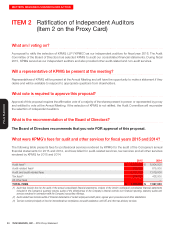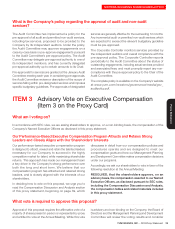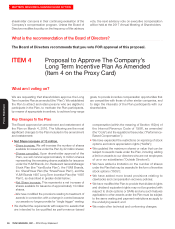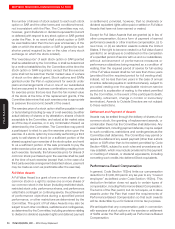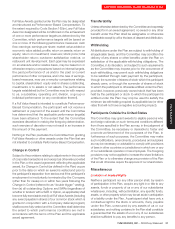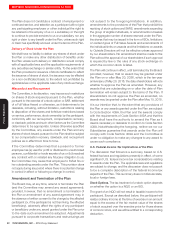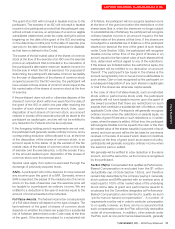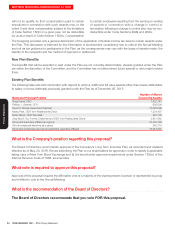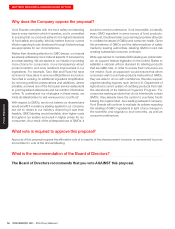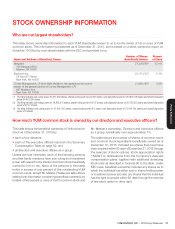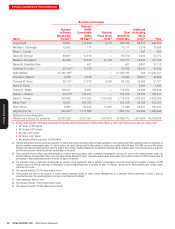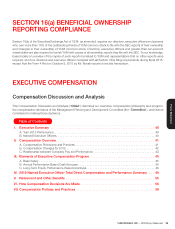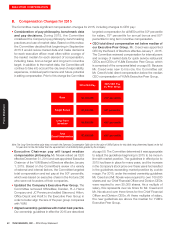Pizza Hut 2015 Annual Report Download - page 47
Download and view the complete annual report
Please find page 47 of the 2015 Pizza Hut annual report below. You can navigate through the pages in the report by either clicking on the pages listed below, or by using the keyword search tool below to find specific information within the annual report.
YUM! BRANDS, INC.-2016Proxy Statement 33
Proxy Statement
MATTERS REQUIRING SHAREHOLDER ACTION
The grant of an ISO will not result in taxable income to the
participant. The exercise of an ISO will not result in taxable
income to the participant provided that the participant was,
without a break in service, an employee of us and our eligible
subsidiaries (determined under tax rules) during the period
beginning on the date of the grant of the ISO and ending
on the date three months prior to the date of exercise (one
year prior to the date of exercise if the participant is disabled,
as that term is defined in the Code).
The excess of the fair market value of the shares of common
stock at the time of the exercise of an ISO over the exercise
price is an adjustment that is included in the calculation of
the participant’s alternative minimum taxable income for
the tax year in which the ISO is exercised. For purposes of
determining the participant’s alternative minimum tax liability
for the year of disposition of the shares of common stock
acquired pursuant to the ISO exercise, the participant will
have a basis in those shares of common stock equal to the
fair market value of the shares of common stock at the time
of exercise.
If the participant does not sell or otherwise dispose of the
shares of common stock within two years from the date of
the grant of the ISO or within one year after receiving the
transfer of such shares of common stock, then, upon
disposition of such shares of common stock, any amount
realized in excess of the exercise price will be taxed to the
participant as capital gain, and we will not be entitled to
any deduction for Federal income tax purposes.
If the foregoing holding period requirements are not met,
the participant will generally realize ordinary income, and a
corresponding deduction will be allowed to us, at the time
of the disposition of the shares of common stock, in an
amount equal to the lesser of (a)the excess of the fair
market value of the shares of common stock on the date
of exercise over the exercise price, or (b)the excess, if any,
of the amount realized upon disposition of the shares of
common stock over the exercise price.
Special rules apply if an option is exercised through the
exchange of previously acquired stock.
SARs. A participant will not be deemed to have received
any income upon the grant of a SAR. Generally, when a
SAR is exercised, the excess of the market price of common
stock on the date of exercise over the exercise price will
be taxable to a participant as ordinary income. We are
entitled to a deduction in the year of exercise equal to the
amount of income taxable to the individual.
Full Value Awards. The federal income tax consequences
of a Full Value Award will depend on the type of award. The
tax treatment of the grant of shares of common stock
depends on whether the shares are subject to a substantial
risk of forfeiture (determined under Code rules) at the time
of the grant. If the shares are subject to a substantial risk
of forfeiture, the participant will not recognize taxable income
at the time of the grant and when the restrictions on the
shares lapse (that is, when the shares are no longer subject
to a substantial risk of forfeiture), the participant will recognize
ordinary taxable income in an amount equal to the fair
market value of the shares at that time. If the shares are
not subject to a substantial risk of forfeiture or if the participant
elects to be taxed at the time of the grant of such shares
under Code Section83(b), the participant will recognize
taxable income at the time of the grant of shares in an
amount equal to the fair market value of such shares at that
time, determined without regard to any of the restrictions.
If the shares are forfeited before the restrictions lapse, the
participant will be entitled to no deduction on account
thereof. The participant’s tax basis in the shares is the
amount recognized by him or her as income attributable to
such shares. Gain or loss recognized by the participant on
a subsequent disposition of any such shares is capital gain
or loss if the shares are otherwise capital assets.
In the case of other Full Value Awards, such as restricted
stock units or performance stock units, the participant
generally will not have taxable income upon the grant of
the award provided that there are restrictions on such
awards that constitute a substantial risk of forfeiture under
applicable Code rules. Participants will generally recognize
ordinary income when the restrictions on awards lapse, on
the date of grant if there are no such restrictions or, in certain
cases, when the award is settled. At that time, the participant
will recognize taxable income equal to the cash or the then
fair market value of the shares issuable in payment of such
award, and such amount will be the tax basis for any shares
received. In the case of an award which does not constitute
property at the time of grant (such as an award of units),
participants will generally recognize ordinary income when
the award is paid or settled.
We generally will be entitled to a tax deduction in the same
amount, and at the same time, as the income is recognized
by the participant.
Section 162(m). Compensation that qualifies as Performance-
Based Compensation is excluded from the $1 million
deductibility cap of Code Section 162(m), and therefore
remains fully deductible by the company paying it. Generally,
stock options and SARs granted with an exercise price at
least equal to 100% of fair market value of the underlying
stock at the date of grant and performance awards to
employees that the Committee designates as Performance-
Based Compensation are intended to qualify as such
“performance-based compensation”. A number of
requirements must be met in order for particular compensation
to so qualify, however, so there can be no assurance that
such compensation under the Plan will be fully deductible
under all circumstances. In addition, other awards under
the Plan, such as non-performance-based awards, generally



